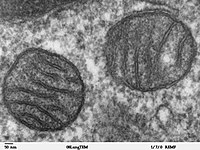
Photo from wikipedia
Varicocele (VC) is a common cause of male infertility, but the molecular mechanisms involved in its pathogenesis are unknown. We investigated the impact of varicocelectomy (VCT) on proteome profiles in… Click to show full abstract
Varicocele (VC) is a common cause of male infertility, but the molecular mechanisms involved in its pathogenesis are unknown. We investigated the impact of varicocelectomy (VCT) on proteome profiles in testicular tissues of rats with VC, and analysed associated target genes and signalling pathways. Sixty male rats with VC were divided into two groups: control (n = 30), and VCT (n = 30). Tissues were collected 4 weeks after sham or VCT surgery. Matrix‐assisted laser desorption/ionisation time‐of‐flight/time‐of‐flight mass spectrometry (MALDI‐TOF/TOF MS) was used to analyse the comparative proteome profiles. Kyoto Encyclopaedia of Genes and Genomes (KEGG) Orthology‐Based Annotation System was used for bioinformatic analysis. Fifteen proteins were differentially expressed between control and VCT groups. These differentially expressed proteins are associated with several specific cellular processes associated with the pathogenesis of testicular growth arrest associated with VC. Furthermore, the evaluation by transmission electron micrograph showed that VCT could decrease apoptosis of spermatogenic cells in rats. Understanding such molecular pathways might provide physicians with a better insight into VC and with potential targets for treatment.
Journal Title: Andrologia
Year Published: 2018
Link to full text (if available)
Share on Social Media: Sign Up to like & get
recommendations!